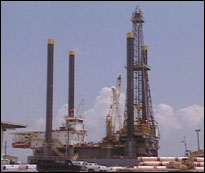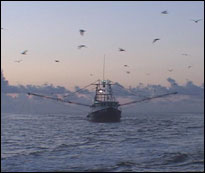And there's another touchy issue: Louisiana's leaders want the nation's taxpayers to pay to fix the wetlands, but they're not demanding money from the industry that helped destroy them.
"It's ludicrous and it's unjust, " says Oliver Houck, who runs the environment program at Tulane University's law school. Houck says major studies show that the wetlands are crumbling partly because the oil and gas companies tore them up. Over the last fifty years, the companies dredged thousands of canals across the wetlands to make it easier to drill wells and lay pipelines.
| |

Lousiana's coastal wetlands are rich in oil and gas. Photo: William Brangham/NOW with Bill Moyers |
"Everybody knows the oil and gas industry is a huge actor in all of this, but nobody goes the next step and says since they're big part of the problem, why don't they help clean it up?" Houck explains, "It's unjust— because they happen to be the richest kid on the block— they happen to be walking away from a scene of destruction they have caused. And they should be paying their bill."
The leaders of the campaign to save the wetlands say it's true, the oil and gas companies have played a big role in destroying them. But King Milling says it's not fair to punish the companies today, for something they did decades ago, especially since government officials encouraged the industry to tear up the wetlands. Everybody wanted their oil and gas.
Milling explains, "I don't remember anyone at that time suggesting that they didn't want the petroleum products. Everybody was doing what they thought was the right thing at the time."
| |

The environment is the economy in Louisiana. Photo: William Brangham/NOW with Bill Moyers |
Oliver Houck says that's not why they're tiptoeing around the energy industry.
"Oil and gas is the dominant industry in this state," he says. "It's like cattle in Nevada. Sugar in Florida. It's the tail that wags the dog. It would be very, very difficult for a public official to back an initiative that was not to the oil companies' liking— and that includes making them help pay to fix the mess in the wetlands that they've created."
An energy industry spokesman told me that they'll think about helping to finance the wetlands projects— if and when they see a firm plan.
But the nation can debate all that in the future. First, business leaders like King Milling need to convince you and your legislators that a national treasure is dying in their backyard, and you have the power to save it. A lot of debates in this country have pit the economy against the environment. But back at his headquarters at the Whitney National Bank, Milling says he's learned a lesson: When it comes to the wetlands of southern Louisiana, the environment is the economy.
"And if it's allowed to fail, the economy will fail, and then we've lost everything."
Can the Plan to Save the Coast Really Work?

